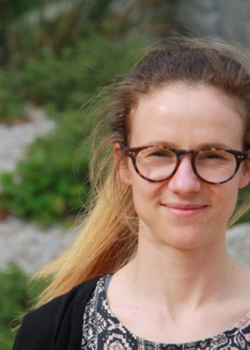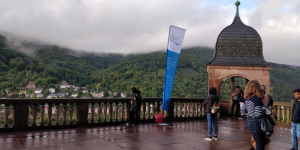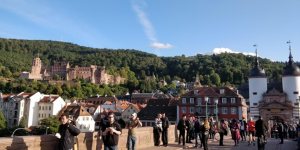Ellena Moskovsky

Ellena Moskovsky
Ellena Moskovsky is a second-year PhD student in pure mathematics at Monash University. After completing her undergraduate degree with a double major in pure mathematics, she decided to enter the workforce. Moving to New Zealand, she worked for an online learning company as a mathematics content developer for three years. After a three-month holiday in South-East Asia, Ellena decided to return to university to complete her honours year, then begin a PhD.
The Heidelberg Laureate Forum (HLF) is an event established by the Klaus Tschira Foundation where “laureates of mathematics and computer science meet the next generation”. Around 25 recipients of esteemed prizes such as the Fields medal, the ACM A.M. Turing award, and the ACM Prize in Computing, to name a few, are invited to the beautiful city of Heidelberg, Germany to meet 200 bright-eyed young learners, interested in seeing what it takes to become a laureate.
In 2019, in the first year of my mathematics PhD, I attended the 7th Heidelberg Laureate Forum as a young researcher. Here is what I learnt. The great minds of today are working on truly amazing and inspiring things. I was lucky enough to hear talks by a small number of the most successful names in the fields of mathematics and computer science alive today and I was awed by many of them. Shwetak Patel broke down my understanding of the functionality of today’s health care with his innovative approach to medicine and diagnosis. He spoke of his ideas to revolutionise the world of medical diagnosis with the use of your smartphone. Patel envisions a world where your smartphone constantly takes samples of all your vital data, providing any doctor with a vast wealth of important and helpful information. It is even conceivable that your phone recognises that you have a problem before you do! Computers are much better than us at detecting minor differences with some statistical significance; perhaps your phone observes a new note in your cough, or in your sneeze, or a change in the way you’re breathing. Martin Hellman reformed my way of thinking ethically in today’s world with his discussion on “The technological imperative for ethical evolution.” He spoke of some of the most influential decisions he has had to make in his life and how his decisions impacted so many lives. Thinking and behaving ethically in such a position is critical.
 The young researchers I met were open-minded, educated and respectful, ambitious to prove themselves and thirsty for knowledge. I encountered many interesting and engaging peers, I enjoyed learning about their research during dinner, or during the poster flash session—where 20-odd young researchers are given three minutes and three slides to talk about their research. I enjoyed learning about their hobbies, passions and interests. I engaged in many heated discussions during and after many of the laureate talks; our workshop on ethics in technology today; the panel on the gender gap. It was easy to make friends with people who are just as passionate as you about something. It was a breath of fresh air to be surrounded by people who would not find your passion for mathematics nerdy, or your silly maths-puns lame.
The young researchers I met were open-minded, educated and respectful, ambitious to prove themselves and thirsty for knowledge. I encountered many interesting and engaging peers, I enjoyed learning about their research during dinner, or during the poster flash session—where 20-odd young researchers are given three minutes and three slides to talk about their research. I enjoyed learning about their hobbies, passions and interests. I engaged in many heated discussions during and after many of the laureate talks; our workshop on ethics in technology today; the panel on the gender gap. It was easy to make friends with people who are just as passionate as you about something. It was a breath of fresh air to be surrounded by people who would not find your passion for mathematics nerdy, or your silly maths-puns lame.
And yet, despite the inspirational talks and interesting like-minded individuals I met, my favourite parts of the forum were the other scheduled events. The last day had scheduled a panel discussion on the gender gap in STEM, a topic I am passionate about. We heard women from the forefront of mathematics and computer science speak about gender and inequity, and divulge some of their experiences. We learnt about research being done in this area, results that are being published and actions that researchers and departments can take. It was great to hear data and opinions from such an experienced and varied panel; such an opportunity to expand the breadth of my knowledge-base in this area does not come often. Each Heidelberg Laureate Forum reserves one afternoon in discussion on a “hot topic”, Climate Change being this year’s title. With the discussion split into two sessions focusing on facts and actions respectively, we heard from experts in the theory behind the science, as well as those at the forefront of combating the crisis.
On a separate note, the event seemed to (most likely, unintentionally) create something of a barrier between the young researchers and the laureates. Not a physical barrier—in fact, we were often graced by a laureate at our lunch or dinner tables, or during coffee breaks. The barrier was more psychological or emotional in nature. It was subtle, but one noticed it when frequently asked “Have you spoken to a laureate yet?”, or when walking around the coffee room and would hear the word ‘laureate’ being muttered and whispered in hushed tones. The point of this event should not be to distance laureates from us, to put them on pedestals and revere them. This makes their achievements seem superhuman and unobtainable. I think (one of) the purposes of an event like this should be the opposite. To meet people who have achieved our goals and to say “hey, I can do that too”, to learn exactly how they managed to achieve these feats and to apply it to our lives. What do I need to do to become a laureate? What does it take? I hope that many young researchers were able to glean this information from their experience at HLF, even if I was not. My experience at the 7th Heidelberg Laureate Forum was certainly interesting, and I left Germany my head buzzing with thoughts and ideas, not of becoming a Fields medallist, but of being a female in mathematics, of what that means to young women who are looking to become mathematicians; of climate change and science technology; of AI and deep learning; of ethics and privacy. The HLF provided me with so much opportunity to question what I know, to think deeply about supposedly simple things, to delve further into inequity and injustice in STEM, and to learn. As someone who loves to learn and to grow, it was a markedly valuable experience for me, and I can imagine it would be for any motivated young researcher.

